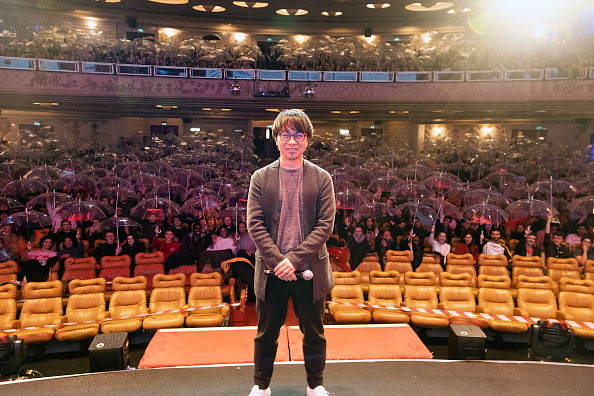In late 2021, Japanese animated filmmaker Makoto Shinkai announced his upcoming Suzume No Tojimari. In English, “Suzume Locking Up the Doors” is slated to be released in Japan in Fall 2022. The doors that the title alludes to are magical doors appearing spontaneously throughout the world, which the heroine, Suzume, must close, with the aid of a mysterious young man. Shinkai’s 2016 hit Your Name, another tale of a young man and woman bound together by bizarre circumstances, solidified his reputation as the spiritual successor to legendary animated filmmaker Hayao Miyazaki. Makoto Shinkai’s works are gorgeously animated tales of love and fate.
In the 2013 drama Garden of Words, Shinkai utilizes a Miyazaki-esque pace, specifically Miyazaki’s principle as ma – Japanese for emptiness. Clapping his hands, he described it to Roger Ebert as the space between his claps.
In Spirited Away, ma is the glittering ocean outside the bathhouse as Chihiro contemplatively stares across the expanse in the direction of her bewitched parents or her long train ride towards the witch’s house: moments of thoughtfulness during which the supernatural landscape breathes around the characters. Shinkai applies the same principle to a much more humble setting, a Japanese garden in which the protagonists, a disaffected youth called Takao, and an unemployed high school literature teacher, Miss Yukino, meet and form a deep platonic bond.
“We have a word for that in Japanese. It’s called ma. Emptiness. It’s there intentionally. [...] If you just have non-stop action with no breathing space at all, it’s just busyness. But if you take a moment, then the tension building in the film can grow into a wider dimension. If you just have constant tension at 80 degrees all the time, you just get numb.”
— Hayao Mizayaki to Roger Ebert
Sheets of falling rain skim the surface of reflecting ponds. The intensity of sunlight filtering through the greenery of the garden varies as the seasons change, as Miss Yukino recovers from severe depression. Takao finds the will to pursue his dreams as the two grow closer in a relationship that defies the conventions of Japanese formality between teachers and students. In the accompanying light novel companion to the film, also written by Shinkai, their story is expanded. It reveals that Takao’s friendship with Miss Yukino gives him the courage to pursue his dream of studying fashion design abroad. In Garden of Words, love, however unconventional, is the catalyst for Takao to find the courage to fulfill his dreams.
In Makoto Shinkai’s most commercially successful film to date, the seminal Your Name, love is literally a life-saving force and defies time, space, and death to preserve the life of the young heroine, Mitsuha. Mistuha, who comes from a family of shrine-keepers in a rural Japanese village, finds herself sharing the thoughts and ‘quantum leaping’ into the life of a Tokyo boy, Taki. Taki and Mistuha reside in each other’s bodies and live each other’s lives, growing to care for one another by becoming each other. Eventually, Taki puts the pieces together that Mitsuha lives in a different timeline than his own. She died three years previously when a meteor struck her village during a meteor shower. Mitsuha’s grandmother, a Shinto shrine priestess, calls connections between human beings by the archaic Japanese word musubi: roughly, ties that bind. Through their supernatural connection, Taki helps Mitsuha rally her town to evacuate before the meteor strikes.
Makoto Shinkai – the modern Miyazaki?
The musubis between Shinkai’s characters are random, unconventional, and primal, rooted in the literature, poetry, and spiritualism of a pre-modern Japan that more modern conventions around human relationships hardly have context for. As Miyazaki hearkens to indigenous and archaic spiritualism and animism in films like Spirited Away and Princess Mononoke, where humans interact with nature’s preternatural forces, Makoto Shinkai alludes to medieval poetry and archaic language to ground his modern characters in a Japanese historical past of clandestine love and karmic passion.
In his hands, these bonds are a peculiar but powerful force that can restore destinies thrown off course. Animated film fans will find out later this year how these themes will come into play in the upcoming Suzume No Tojimari.
More From LWOS Life
Make sure to stay tuned to LWOS Life for more on this and other stories from around the world of entertainment, culture, and more as they develop. You can always count on LWOS Life to be on top of the major news in the world of entertainment; while also providing you with editorials on everything from beer to movie reviews.
Featured image credit

